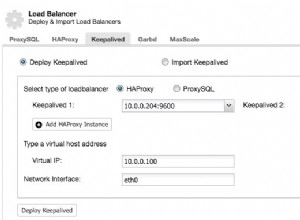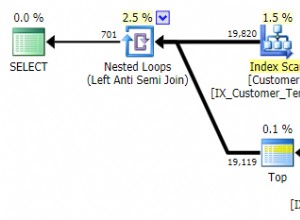Désolé pour la nécromancienne, mais j'ai rencontré un problème similaire. La solution est :JSON_TABLE() disponible depuis MySQL 8.0.
Tout d'abord, fusionnez les tableaux en lignes en un seul tableau à une ligne.
select concat('[', -- start wrapping single array with opening bracket
replace(
replace(
group_concat(vals), -- group_concat arrays from rows
']', ''), -- remove their opening brackets
'[', ''), -- remove their closing brackets
']') as json -- finish wraping single array with closing bracket
from (
select '[801, 751, 603, 753, 803]' as vals
union select '[801, 751]'
union select '[578, 66, 15]'
) as jsons;
# gives: [801, 751, 603, 753, 803, 801, 751, 578, 66, 15]
Deuxièmement, utilisez json_table pour convertir le tableau en lignes.
select val
from (
select concat('[',
replace(
replace(
group_concat(vals),
']', ''),
'[', ''),
']') as json
from (
select '[801, 751, 603, 753, 803]' as vals
union select '[801, 751]'
union select '[578, 66, 15]'
) as jsons
) as merged
join json_table(
merged.json,
'$[*]' columns (val int path '$')
) as jt
group by val;
# gives...
801
751
603
753
803
578
66
15
Voir https://dev. mysql.com/doc/refman/8.0/en/json-table-functions.html#function_json-table
Remarquez group by val pour obtenir des valeurs distinctes. Vous pouvez également order eux et tout...
Ou vous pouvez utiliser group_concat(distinct val) sans le group by directive (!) pour obtenir un résultat sur une ligne.
Ou même cast(concat('[', group_concat(distinct val), ']') as json) pour obtenir un tableau json approprié :[15, 66, 578, 603, 751, 753, 801, 803] .
Lisez mes Best Practices for using MySQL as JSON storage :)




